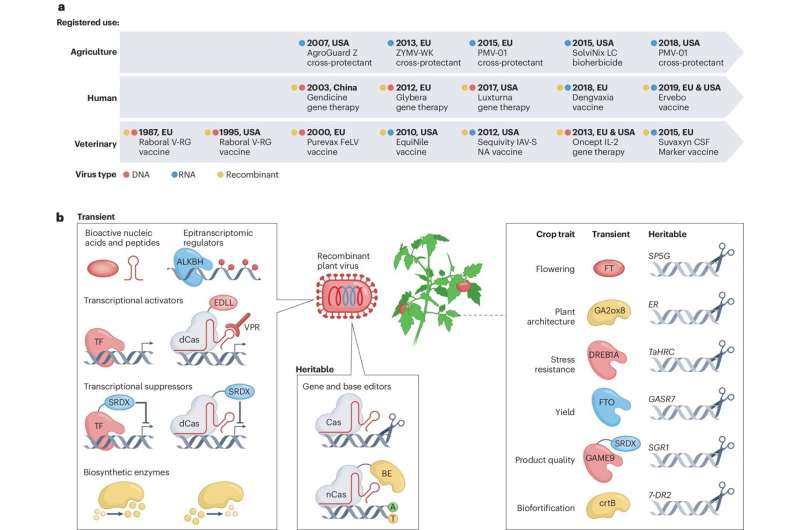
September 10, 2024 by Spanish National Research Council
Collected at: https://phys.org/news/2024-09-roadmap-viruses-crop.html
Humans, livestock and companion animals benefit from virus-based vaccines and gene therapies, but crops do not. This paradox is highlighted by an international research group led by the Institute of Molecular and Cellular Biology of Plants (IBMCP) within the Spanish National Research Council (CSIC), in an article published in Nature Reviews Bioengineering.
The study proposes a roadmap to use attenuated viruses to enhance the performance of crops, making them more resistant to extreme and changing climate conditions, or to produce dietary supplements for improved human nutrition. According to the authors, this is a more efficient and sustainable alternative to agrochemicals and faster than traditional breeding methods.
The article is part of the “Future of Food” collection, in which the journals Nature Reviews Bioengineering and Nature Food present articles discussing technological progress and opportunities for engineered food technologies.
“Our article presents thought-provoking viewpoints and confronts readers with paradoxical situations,” says Fabio Pasin, a CSIC researcher at the IBMCP and lead author of the study. The authors propose that viral vectors, based on attenuated viruses that do not harm plants, could be used to introduce specific genes into crops, thus improving their agronomic traits. These viral vectors could be used to induce plant flowering and accelerate harvests; develop improved crop varieties; modify plant architecture to facilitate mechanization; improve drought tolerance; or produce metabolites beneficial to human health, among other applications.
Using attenuated viruses might be the best way to achieve desired plant traits.
“Imagine using a computer that isn’t connected to the internet, and every time you need a software update, you have to buy a new computer,” says Dr. Pasin. “Well, our idea is to use a virus like a USB stick: you connect it to the computer, install updates, and continue using it.”
“These vectors can be used for precise genome editing through CRISPR-Cas components to achieve heritable improvements in agronomic traits, such as grain length and weight in wheat or fruit color in tomatoes. Additionally, viral vector applications allow for temporary improvements, offering an attractive alternative, due to their rapid development and validation, to the use of agrochemicals for more efficient and sustainable agricultural production systems,” says the CSIC researcher.
Humans, livestock, and pets, but not plants
Despite these advantages, the authors point out several paradoxes: It is considered safe to administer recombinant viruses to humans (e.g., against COVID-19) and veterinary vaccination, yet no agricultural use is registered. Humans and domestic animals can benefit from gene therapies based on recombinant viruses, but crops cannot.
Recombinant viruses can be released into the environment to immunize wildlife like foxes, raccoons, or coyotes, thereby controlling rabies in Europe and the United States, but their agricultural use is still not authorized, not even in highly confined environments.
What is needed to implement it?
Given the advantages, could this new technology be implemented in crops? One obstacle is regulatory issues. In a transient delivery approach, which would allow the use of viral vectors for immediate plant improvements, scientists see a certain gap.
“It’s a new type of product, similar to an agrochemical, but being biological, there is currently nothing equivalent on the market for agricultural use, so we have no precedents and a thorough analysis by authorities would be needed,” explains Dr. Pasin.
This process could be expedited by using recombinant viruses that implement methods to ensure biocontainment and by prioritizing crops used for animal feed, textile fibers, biofuels, or ornamental purposes, he argues.
In plants, viral vector technology is in an advanced research phase and its effectiveness has been demonstrated under experimental conditions. At CSIC, researchers optimize technological platforms to accelerate the development and validation of agricultural applications based on viral vectors, implementing synthetic biology approaches compatible with future industrial-scale production. Additionally, they explore the use of viral vectors to improve the agronomic characteristics of crops, such as tomatoes.
More information: Fabio Pasin et al, Engineering good viruses to improve crop performance, Nature Reviews Bioengineering (2024). DOI: 10.1038/s44222-024-00197-y
Journal information: Nature Reviews Bioengineering , Nature Food

Leave a Reply